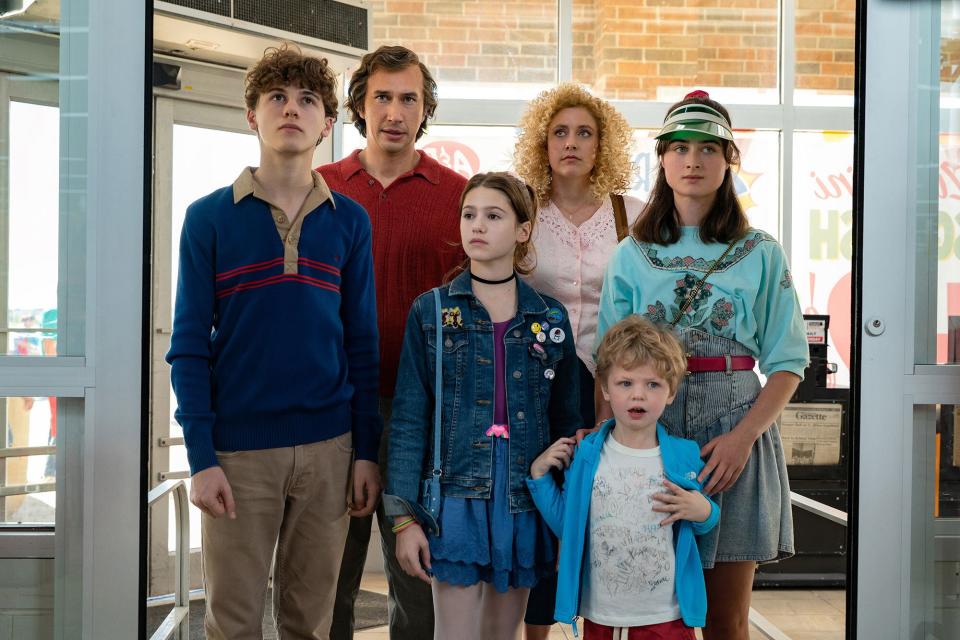White Noise review: Noah Baumbach wrestles with a brilliant, impossible novel

Postmodernism is a hell of a drug. In the opening chapter of Don Delillo's classic 1985 novel White Noise, a college professor named Jack Gladney relays the ordinary details of his world: a wife, four children, the daily campus grind. He speaks of station wagons and airport Marriotts, corduroyed coworkers and trips to the grocery store. And yet nearly every line wriggles with surreal comedy, panicky and elastic and preposterously alive. For several decades, various Hollywood luminaries tried and failed to take it on; Noah Baumbach is the first to succeed, and his adaptation, which had its North American premiere last night at the New York Film Festival before it lands on Netflix this December, feels like a film made with deep respect and affection for its source material. But it also seems, in nearly every scene, like he's dancing about architecture, trying to wrest something from the strange magic of those pages that refuses to be translated to the screen.
It helps that he has two of his favorite collaborators to help carry the load: Adam Driver, whom he's now worked with five times, is the garrulous, Buddha-bellied Jack, and Greta Gerwig, another regular coconspirator and also Baumbach's partner in life, is Jack's wife Babette, a suburban goddess in a blonde spiral perm. It's the fourth marriage for them both and soft middle-age is settling in, though they're still almost unfailingly hot for each other in and out of the bedroom. There are also three children from previous unions — imperious teen Denise (Raffey Cassidy), along with Heinrich and Steffie (real siblings Sam and May Nivola) — and one small product of their own, a beaming cherub named Wilder. Life in the Gladney house carries on in a state of messy domestic bliss, tempered with the usual petty irritations and complaints, until the day a highly flammable tankard collides with a train outside of town, and a noxious black plume appears on the horizon.

Wilson Webb/Netflix 'White Noise'
Soon the plume has been upgraded to something officials are calling an Airborne Toxic Event, though semantics don't really explain what that means for all the distraught humans on the ground. Ordered to evacuate, they set out for temporary shelter, one more freaked-out family in a tangle of standstill traffic and hazmat tents. But what are the little white pills that Babette keeps surreptitiously popping, insisting it's just air or cherry LifeSavers when she's pressed? If you're familiar with the book, you may have some recall of what follows, though Noise is hardly linear in any traditional sense of plot or pacing.
Baumbach lays out numerous setpieces — at the college where Jack teaches Hitler Studies; in the stacked, gleaming aisles of the local A&P; even an unscheduled car ride down a river — with high auteur style, steeped in the shiny consumerism and thrumming low-grade paranoia of peak-'80s America. He draws great, zesty performances from his supporting cast, including Don Cheadle as a garrulous fellow professor, and the German actress Barbara Sukowa as an ornery apostate nun. (Nobody casts extras like him, too; they have faces). Driver brings something both salty and haunted to Jack, and Gerwig feels like a beating heart, alive to every sunburst and storm cloud of her emotional weather.
But they all have to reckon with dialogue whose satirical fizz and deadpan rhythms don't often translate to anything resembling real life, and a book whose brilliance stubbornly resists any other medium but itself. Compared to the tender groundedness of Baumbach's finest films, like The Squid and the Whale and Marriage Story, the scampering leaps and feints of his script here come off as deliberately arch, even artificial. The movie's final scene, though, without spoiling too much, is also easily its best: a bravura grocery-store dance sequence anachronistically soundtracked by the Brooklyn art-pop band LCD Soundsystem that recalls everything from Jacques Demy's French New Wave classic The Umbrellas of Cherbourg to the 2003 Japanese marvel The Blind Swordsman. It's nothing like the ending of the novel, and maybe that's why it's so good: a moment of pure unfettered inspiration, joyful in its own noise. Grade: B–
Related content:

 Yahoo Movies
Yahoo Movies 